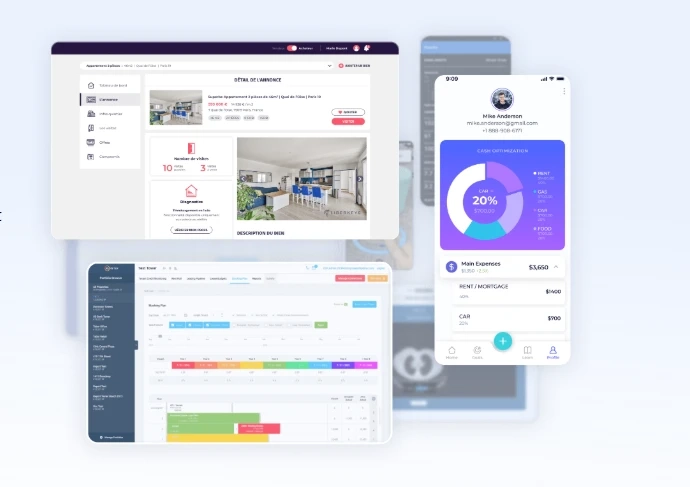In today's fast-paced business world, technology plays a crucial role in driving efficiency, innovation, and competitive advantage. Custom software development is a powerful tool that can help businesses solve specific challenges, streamline processes, and enhance customer experiences. However, the success of a custom software project depends significantly on choosing the right software development partner.
Whether you're looking to build a bespoke application, a mobile solution, or an enterprise-level platform, selecting the right development team can be the difference between success and failure. This article will guide you through the key considerations and steps to help you choose the ideal custom software development partner for your business needs.
Why Custom Software Development Matters
Custom software development allows businesses to build applications that are tailored to their specific requirements, offering a unique solution to their challenges. Unlike off-the-shelf software, which may come with generic features and limitations, custom software is designed with your company’s workflows, goals, and growth strategies in mind. By opting for a custom-built solution, businesses gain:
- Scalability: As your business grows, your software can be updated or expanded to meet new demands.
- Efficiency: A well-designed solution can streamline operations, reduce manual work, and improve productivity.
- Competitive Edge: Custom software can be a unique asset that sets you apart from your competitors.
- Security: Tailored software can better meet your security needs and compliance requirements.
Given the importance of custom software, it’s essential to select the right partner for the job. A skilled and experienced custom software development partner can help you create a high-quality solution that meets your goals and delivers long-term value.
Step-by-Step Guide to Choosing the Right Custom Software Development Partner
1. Define Your Business Needs and Goals
Before starting the search for a custom software development partner, you must first clearly define what you need. Having a clear vision of your business requirements will help you communicate your goals effectively to potential partners. Ask yourself the following questions:
- What problem is the software meant to solve?
- Who will be the end-users of the software (e.g., employees, customers, partners)?
- What features and functionalities do you need the software to have?
- What is the expected timeline for development and delivery?
- What is your budget for the project?
A well-defined set of goals will give you a roadmap to follow throughout the selection process and help you assess whether a potential partner is aligned with your objectives.
2. Look for Relevant Expertise and Experience
The ideal custom software development partner should have a proven track record in developing solutions similar to your business needs. Look for partners with experience in:
- The specific technology stack you plan to use (e.g., web, mobile, cloud technologies).
- Your industry or vertical (e.g., healthcare, retail, finance).
- Working with businesses of your size and complexity.
Ask potential partners about their past projects and the industries they specialize in. You can also request case studies, client testimonials, or references to evaluate their ability to deliver high-quality software.
3. Check Their Technical Competency
A good custom software development partner should have deep technical expertise in the relevant programming languages, frameworks, and platforms. Ensure that they are well-versed in:
- Programming languages like Java, Python, JavaScript, Ruby, etc.
- Frameworks such as React, Angular, Django, Laravel, etc.
- Database management systems like MySQL, MongoDB, PostgreSQL.
- Cloud services such as AWS, Azure, or Google Cloud.
- Security standards and best practices.
Beyond technical knowledge, it's essential to assess their problem-solving skills, their ability to innovate, and their understanding of the latest trends in custom software product development services. A development partner who is up-to-date with emerging technologies and practices can help you stay ahead of the curve.
4. Evaluate Their Development Process and Methodology
The development process is a critical factor that can impact the success of your project. When evaluating potential partners, understand their development methodology and approach to project management. Common methodologies include:
- Agile Development: An iterative process that focuses on collaboration, flexibility, and delivering incremental improvements. Agile is ideal for businesses that require quick adjustments and regular feedback loops.
- Waterfall Development: A more traditional approach with a sequential flow from planning to execution. This method is best suited for projects with clear, fixed requirements.
- DevOps: A combined approach to software development and IT operations, which aims to shorten development cycles, increase deployment frequency, and deliver high-quality software.
A transparent and collaborative process, whether Agile or another methodology, will help ensure that your custom software meets expectations, is delivered on time, and stays within budget.
5. Consider Communication and Collaboration
Effective communication is crucial throughout the software development lifecycle. A development partner who can communicate clearly and is responsive to your needs will ensure that the project runs smoothly. Look for these communication qualities:
- Transparency: They should keep you updated on project milestones, challenges, and progress.
- Collaboration: They should work closely with you and your team to understand your needs, provide suggestions, and ensure alignment throughout the process.
- Flexibility: They should be open to feedback and be willing to make changes as needed to ensure the final product meets your business requirements.
The ideal development partner should be a strategic collaborator, not just a vendor. They should be invested in your success and be able to provide valuable insights and recommendations.
6. Assess the Quality of Their Support and Maintenance Services
Software development doesn’t stop once the application is built and deployed. Your custom software will require regular maintenance, updates, and bug fixes to ensure it continues to function optimally. Therefore, it’s important to select a partner who offers:
- Post-launch support: Ensure they provide long-term maintenance, including bug fixes, performance optimization, and the ability to scale the software as your business grows.
- Clear Service Level Agreements (SLAs): The partner should offer clear terms for response times, issue resolution, and ongoing support.
Ask about their approach to software maintenance and how they handle system updates or improvements. This will ensure that your investment in custom software continues to deliver value over time.
7. Evaluate Their Team Structure and Resources
Take a closer look at the development team’s structure and the resources they have available. A good development partner will have a well-rounded team with the right mix of skills and expertise. The core members should include:
- Project Managers to oversee timelines, budgets, and communication.
- Business Analysts to bridge the gap between business needs and technical solutions.
- Developers with expertise in the relevant technologies.
- Quality Assurance (QA) Engineers to ensure that the software meets the highest standards of quality.
- UI/UX Designers to ensure the application is user-friendly and visually appealing.
It's also important to understand their capacity to scale the team if needed. This is particularly important for larger projects or those with tight deadlines.
8. Consider Cost vs. Value
While cost is a critical factor in choosing a custom software development partner, it should not be the only consideration. Remember, custom software is a long-term investment, and opting for the cheapest option may not always deliver the best value. Instead of just focusing on cost, assess the overall value you will receive from the development partner, including:
- Quality of work: High-quality custom software will bring more significant business benefits over time.
- Experience and expertise: An experienced partner can often complete the project faster and with fewer issues.
- Scalability: A partner who can support your long-term needs will save you from future headaches.
In the end, choosing a partner based on value rather than just cost will result in a better return on investment.
9. Request a Pilot or Proof of Concept
Before committing to a long-term partnership, consider asking the potential partner to create a pilot or proof of concept (PoC) of the software. This will give you a firsthand look at their capabilities, the quality of their work, and how well they understand your requirements. A PoC or prototype can also help you identify any potential issues early in the development process, saving you time and money in the long run.
10. Trust Your Instincts and Build a Strong Relationship
Finally, trust your instincts when selecting a custom software development partner. While technical skills and experience are essential, it’s equally important to choose a team that aligns with your company culture and values. Building a strong, collaborative relationship with your partner is key to the success of the project.
Conclusion
Choosing the right custom software development partner is a critical decision that can greatly impact your business's success. By considering factors such as expertise, communication, development process, support, and cost, you can ensure that your partner is equipped to deliver high-quality software that meets your specific needs.
For businesses seeking to leverage custom software for growth, operational efficiency, and innovation, working with an experienced and reliable partner is essential. If you're looking for expert custom software product development services, be sure to evaluate potential partners carefully to ensure a successful, long-term collaboration.



